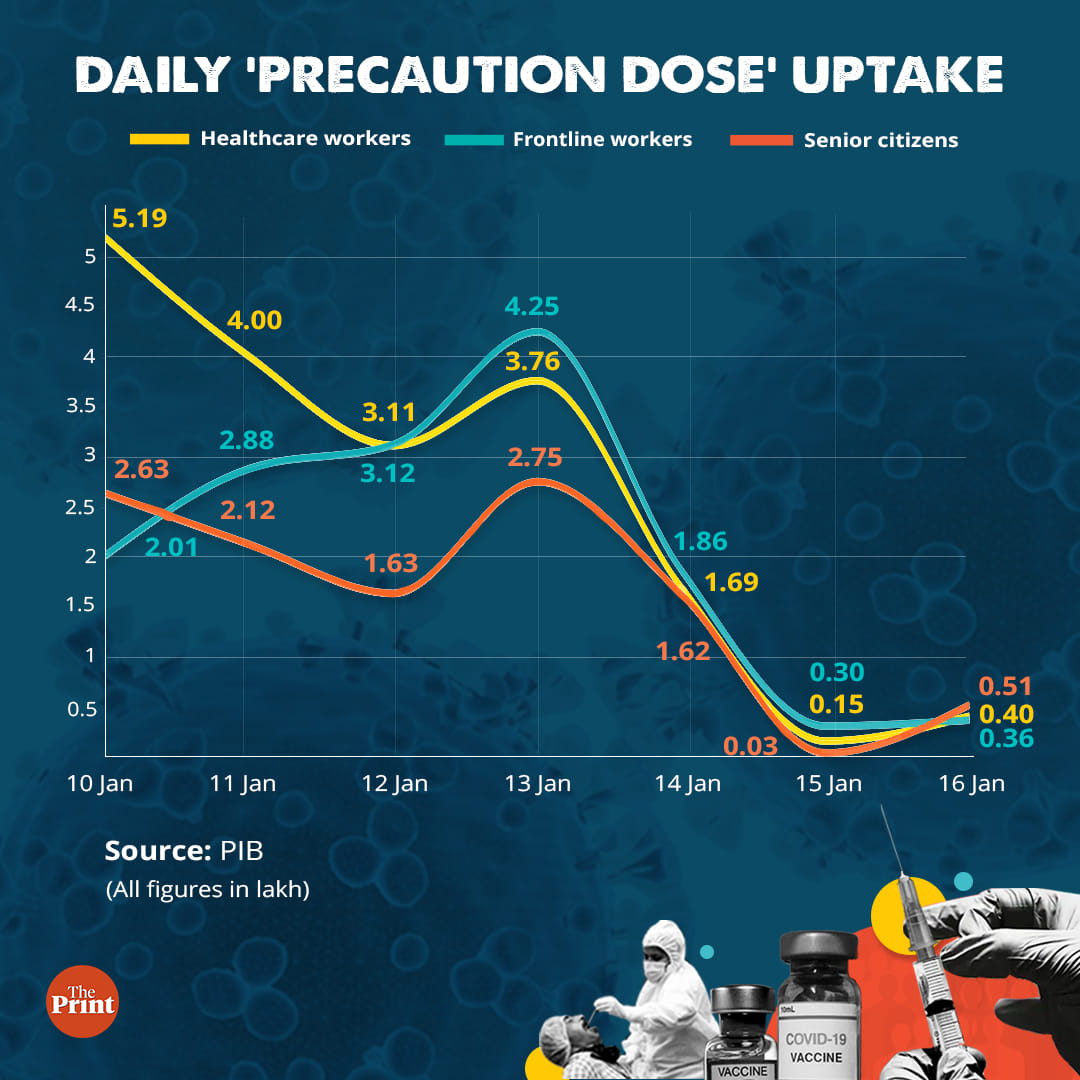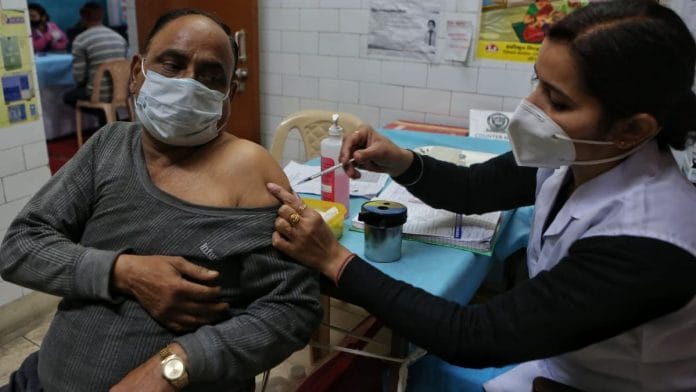New Delhi: One week after precaution doses were rolled out for healthcare and frontline workers and vulnerable senior citizens, uptake seems to be sluggish. Doses administered to healthcare workers seem to be on a steady downward spiral, while others are fluctuating.
One reason for this can be that India’s initial spurt of vaccine hesitancy, immediately after Covid-19 vaccines were rolled out last year, seems to have returned. Only, this time, it is about booster shots, or precaution doses, as the government has termed them.
The other reason for the falling figures could be the high numbers of doctors and healthcare staff who have contracted the virus.
On the first day, 10 January, about 5.19 lakh healthcare workers were vaccinated. On 14 January, which was the last working day, the number was down to 1.69 lakh doses. Just about 55,000 HCWs took the third shot over the weekend.
For frontline workers, the opening day’s numbers were 2.01 lakh booster shots and for senior citizens the number was 2.63 lakh. On 14 January, the numbers stood at 1.86 lakh and 1.62 lakh, respectively. There was also a significant dip for these two categories Saturday and Sunday.
According to government estimates, India has 1.05 crore healthcare workers, 1.9 crore frontline workers and 2.75 crore senior citizens with comorbidities. Of the total 44,48,183 precaution doses administered so far, 18,33,301 were administered to healthcare workers, 14,81,773 to frontline workers, and 11,33,109 to senior citizens.

Of these, the most number of people eligible for booster shots would be among healthcare workers, since they were the first group to be vaccinated when the programme kicked off on 16 January 2021 and also got their second shots faster than the others, because in those early days the second-dose gap for both Covisheld and Covaxin was 28 days.
Reached for comment, a senior government official associated with the vaccination drive said “thank you for flagging this”. “We would need to do a deep dive into the numbers to come to a conclusion about whether there is really a slowing down or hesitancy. We would need to look at the numbers that became fully vaccinated nine months ago and then see what it is like. We will do the analysis soon,” the official added.
Also read: Govt clears air on precaution dose — it will be the same as the first two shots
Many healthcare workers infected, ineligible
Officials in the Union Ministry of Health & Family Welfare say there are no consolidated all India numbers for infections among healthcare workers, but ground reports suggest the number is already fairly high.
Some 750 doctors in Delhi and around 500 in Mumbai are down with Covid, ruling them out for the precaution dose for some time.
Sources also say that, for the past five days, the Government of India has reached out to hospitals, asking for details of doctors who are down with Covid and their vaccination status.
On infections among healthcare workers, the government official said, “Those who have Covid already have an Omicron-specific booster shot. So they do not really need the precaution dose. Anyway, after infection, they should ideally wait for three months before taking the shot.”
‘Doubts’ among doctors
Commenting about the low vaccination numbers, a senior doctor in a Delhi government hospital said that a combination of infections and hesitancy is ensuring low uptake of the precaution doses.
“See, there are two categories of doctors right now. The biggest is the ones who have already fallen ill. In our hospital, almost all residents are either down or have been down in the past few days with Covid,” the doctor added on the condition of anonymity. “So they are not taking [the third dose]. The other group is the one that has now started doubting the vaccines themselves, given the high rate of breakthrough infections.”
“Half are infected, half are doubtful. So many fell ill two days after taking the shot, because one of the rules of vaccination is that when you give it during an epidemic, more people fall ill because of a transient lowering of immunity,” the doctor said.
While in his hospital doctors had to wait for the precaution doses to be allowed by the government, in many private hospitals in the city, doctors paid for the shots themselves and took them before the government recommendation arrived.
“For us, it is a matter of our own safety. The government can take its time, but we could see what was coming and so we took steps to secure ourselves,” said a senior doctor in a South Delhi hospital.
In a tweet Monday, Dr Anoop Misra, chairman, Fortis CDOC Hospital for Diabetes and Allied Sciences, and former professor of medicine, AIIMS New Delhi, weighed in on the possible reasons behind the “very poor attendance” for boosters among the eligible sections.
These included fears about going out and apprehensions that people may catch Covid in hospital. According to Misra, reports about Omicron being “mild” are also a factor.
We have very poor attendance for #boosters. Reasons:
1. People are afraid to go out
2.They think they may get #infection in hospital
3. They think they are protected because of two doses
4. They think #omicron is mild. https://t.co/y6cLgPY20I
— anoop misra (@docanoopmisra) January 17, 2022
This report has been updated with additional information
(Edited by Saikat Niyogi)
Also read: Authorities step up efforts to vaccinate staff, shopkeepers against Covid at markets across Delhi






